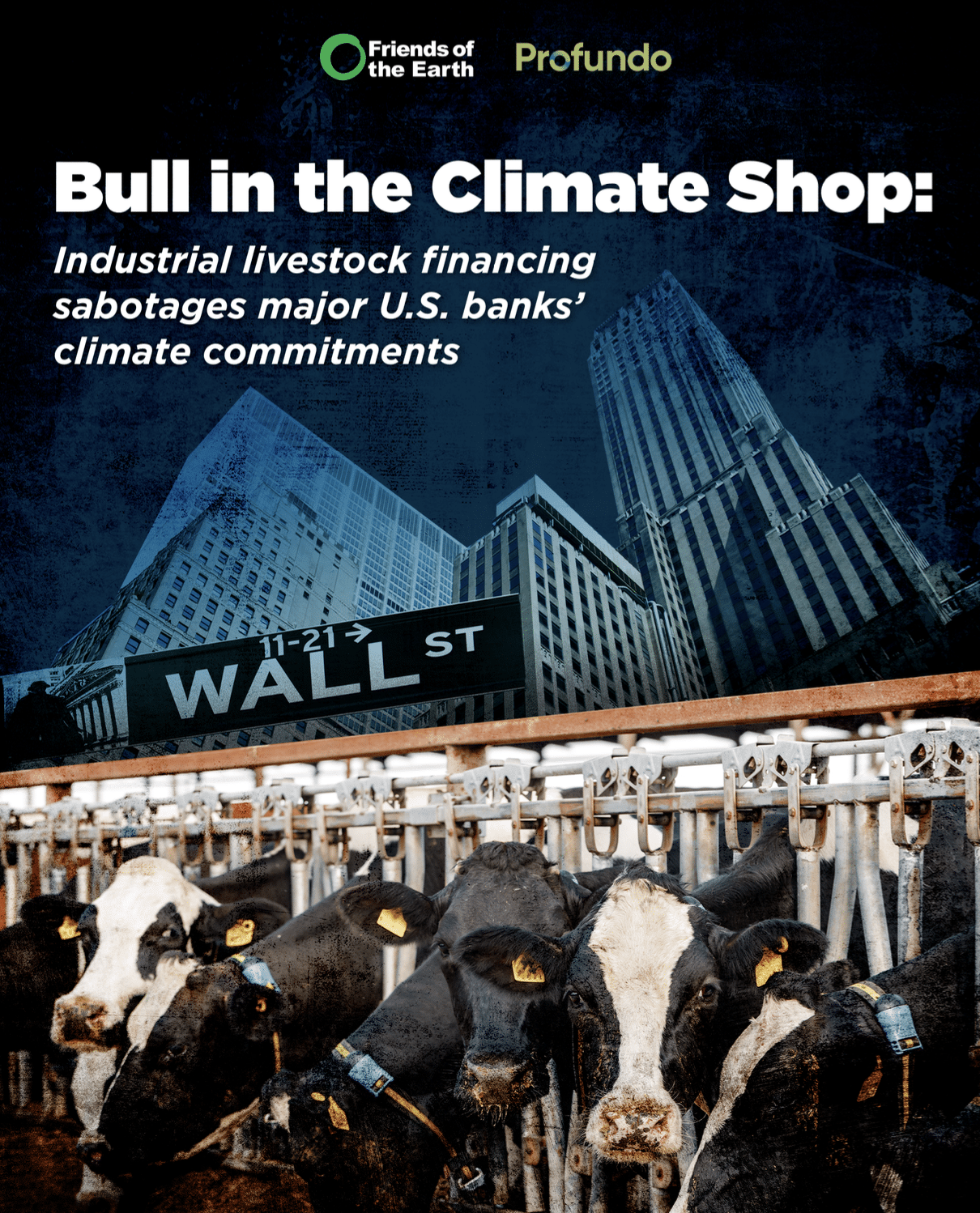- Home
- Food & Agriculture
- Animal Agriculture
- Bull in the Climate Shop
Bull in the Climate Shop
Industrial Livestock Financing Sabotages Major U.S. Banks’ Climate Commitments
Download the executive summary
Download the full report (with methodology annex)
Read the press release
Watch our video
As the climate crisis has intensified, U.S. banks have come under increasing pressure to slash their greenhouse gas (GHG) emissions attributable to the loans, underwriting, investments, and other financial services they provide. Many of the largest banks have responded to these demands by committing to align their portfolios with pathways to net zero by 2050 or sooner. While leading U.S. banks have made bold statements regarding the importance of reducing emissions from food and agriculture, such statements have yet to translate into action — especially for industrial livestock which drives a majority of global food and agriculture emissions.
The report Bull in the Climate Shop, co-authored by Friends of the Earth and Profundo, examines U.S. bank financing of meat, dairy, and feed corporations and the sizable climate impact of that financing. Bank of America, Citigroup, and JPMorgan Chase (the “Big Three”) are responsible for more than half of the $134 billion in loans and underwriting examined in the report. This financing presents an outsized impediment to banks meeting their climate commitments. Therefore, Friends of the Earth is calling on the Big Three and all major U.S. banks to:
- Halt all new financing that enables the expansion of industrial livestock production.
- Require meat, dairy, and feed clients to disclose third-party verified 1.5°C targets and action plans that align with IPCC or an equivalent science-based sectoral pathway.
Key findings from the report include:
- Financing of meat, dairy, animal feed, food processing, and agri-commodity corporations has an outsized impact on the Big Three banks’ financed emissions, accounting for just 0.25% of the banks’ total loans outstanding but roughly 11% of reported financed emissions — a 44X difference.
- Industrial livestock production generates massive GHG emissions: Together, the 56 largest corporations involved in meat, dairy, and/or feed production generate more carbon dioxide-equivalent emissions each year than the entire nation of Japan, the world’s eighth largest emitter.
- U.S. bank financing to corporations involved in meat, dairy, and/or feed production has significant climate impacts: U.S. banks financed and facilitated 63.1 million metric tons of carbon dioxide-equivalent emissions in 2022 via their lending and underwriting to meat, dairy, animal feed, food processing, and agri-commodity corporations.
- Methane impact is worse for warming than CO2: Up to 70% of the 58 U.S. banks’ total meat and dairy related financed and facilitated emissions are methane (using GWP20), which has 80X the warming potential of carbon dioxide.
- Meat and dairy corporations’ actual emissions may be up to 4X higher than reported figures: Meat, dairy and feed corporations omit or understate their emissions by millions of tons a year, masking their impact on U.S. banks’ Scope 3 totals.
- Meat giants, food processing corporations, and agri-commodity traders that supply animal feed are the highest emitters among the Big Three U.S. banks’ livestock value chain clients:
- Cargill, ADM, Bunge and Nestlé account for the bulk of financed emissions (Bank of America, 76%; Citigroup, 92%, and JPMorgan Chase, 86%).
- Bank of America’s underwriting of JBS alone accounted for 87% of its facilitated methane emissions from meat and dairy corporations.
According to the findings of the report, taking action to reduce financed and facilitated emissions from corporations involved in meat, dairy, and/or feed production could be one of the most effective measures major U.S. banks could take to make progress toward their climate commitments.

